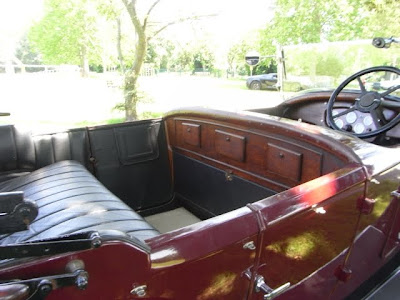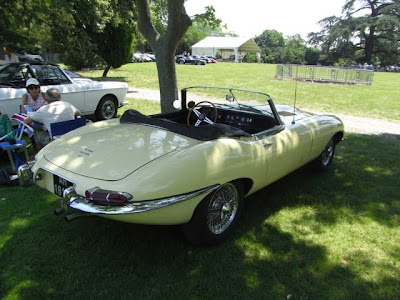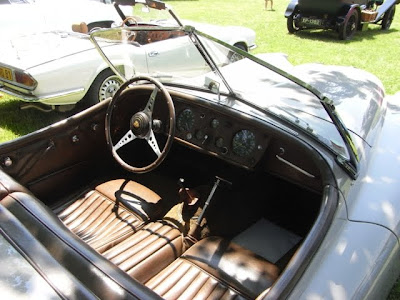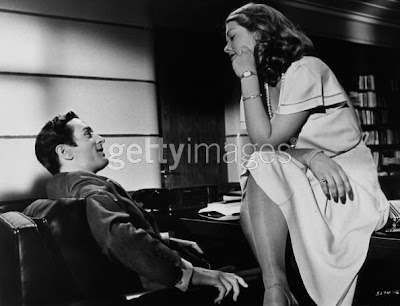In Persian Jasmine means "Gift From God", enjoying it as I am at the moment it truly is.
Tuesday, June 29, 2010
When The Jasmine Is High
The Jasmine is out out the moment it is glorious, I love it and have planted lots of evergreen and deciduous varieties in my garden. The flowers light up at dusk and look like thousands of little stars and the fragrance just wafts all over the garden, with the windows open it is permeating the house. I have been languid every afternoon as I lie on a chaise longue, watching Wimbledon, I get sudden bursts of it's beautiful fragrance and in the late evening, outside, draining the last of a fine bottle, with friends, the fragrance is still working it's magic on all our senses.
In Persian Jasmine means "Gift From God", enjoying it as I am at the moment it truly is.
In Persian Jasmine means "Gift From God", enjoying it as I am at the moment it truly is.
Sunday, June 27, 2010
A Vintage Day Out
I think I have mentioned in previous posts that MG is a petrol head, MG recently met a fellow petrol head and now he and his lovely (long suffering, quite enthusiastic but not a complete petrol head!) wife have become good friends.
N, petrol head number two restores and sells retro cars, mainly Messershcmitts (that's Micro cars to you and me, he has barns full of his collection of amazingly quirky cars which include Bubble cars some of which have been used in pop videos) and vintage motor cycles like the Brough Superior most famous for being the vehicle of choice to Lawrence of Arabia, N informed me he died by crashing his seventh one whilst the eighth was on order.
Messershcmitt (Micro Car) MG thinks they look like Mud skippers
I think he has a point!
A Concours d'Elegance.
As I have been posting a lot recently on this era, I jumped at the chance, for a ride in a vehicle of this period and Crusoe was also invited.....
Here she is in colour, she is beautiful and much more comfortable and stately than modern cars, you really have a sense that you are sitting in a carriage and the quality of workmanship and detail is gorgeous, no plastic or cheap upholstery involved, not to mention the fact that she purrs along quite happily at around 60MPH, I believe they can reach speeds of 90MPH, quite a feat for a car that is nearly 90 years old. I thought it would be jerky and uncomfortable but no, a very smooth ride.
Crusoe's ears flapping in the wind, he enjoyed it too, smelling the countryside whizzing by, although we did hold onto him, just in case he felt the urge to jump out to chase something.
We had to strap the picnic hamper onto the running board as there is no boot.
Whilst at the show we admired other cars, this is a 1929 Hotchkiss.
Whilst the boys talked about technical things, I pondered on what previous passengers might have stored in these little boxes.
Mmm my favourite an E Type Jaguar.
That's what I call a dash board!
MG, explained this one is better, can't remember why, think because it's older! And it's series one.
And something to do with original bucket seats!
This one is pretty, another Jaguar, can't remember which one, I'm useless with cars, I just go "Oh look at that one, it's pretty" MG keeps trying to teach me about chassis and stuff but it just goes in one ear and out of the other, he despairs.
Front View
Interior View
Back at N's he put's his elegant Green Lady to bed (In her personal garage)
A lovely day, with a lovely picnic washed down with Champagne I now know why a headscarf is essential wear for open topped cars, even though I had my hair tied in a pony tail, it still took me ages to get the knots out!
I wore my new vintage ring, remind you of anything? Note I am lacking bangles, next time...with the marcel wave and headscarf.
Thursday, June 24, 2010
Nancy Cunard
Her father was Sir Bache Cunard, an heir to the Cunard Line shipping businesses, interested in polo and fox hunting, and a baronet. Her mother was born Maud Alice Burke (1872-1948), and was an American heiress; adopting the first name Emerald Lady Cunard became a leading London society hostess. Nancy had been brought up on the family estate at Nevill Holt, Leicestershire but when her parents separated in 1910 she moved to London with her mother. Her education was at various boarding schools, including time in France and Germany.
She had a short-lived marriage during World War I to Sydney Fairbairn, a cricketer, an army officer and wounded war veteran; it lasted less than two years before they separated. She was also at that time on the edge of the influential group The Coterie, associating in particular with Iris Tree.
She contributed to the Sitwell anthology Wheels, providing its title poem; it has been said that the venture was originally her project.
In 1920 Nancy Cunard moved to Paris, where she became involved with literary Modernism, Surrealists and Dada. Much of her published poetry dates from this period. During her early years in Paris, she was close to Michael Arlen.
A brief relationship with Aldous Huxley influenced several of his novels. She was the model for Myra Viveash in Antic Hay (1923) and for Lucy Tantamount in Point Counter Point (1928).
It has been suggested that she became dependent on alcohol at this time, and may have used other drugs.
In 1927 Cunard moved into a farmhouse in La Chapelle-Réanville, Normandy. It was there in 1928 that she set up the Hours Press. Previously the small press had been called Three Mountains Press and run as a hobby by William Bird, an American journalist in Paris, who had already produced work by Ezra Pound. Cunard wanted to support experimental poetry and provide a higher-paying market for young writers; her inherited wealth allowed her to take financial risks that other publishers could not. Hours Press became known for its beautiful book designs and high-quality production.
In 1928 (after a two-year affair with Louis Aragon) she began a relationship with Henry Crowder, an African-American jazz musician who was working in Paris. She became an activist in matters concerning racial politics and civil rights in the USA, and visited Harlem. In 1931 she published the pamphlet Black Man and White Ladyship, an attack on racist attitudes as exemplified by Cunard's mother, whom she quoted as saying "Is it true that my daughter knows a Negro?" She also edited Negro: An Anthology, collecting poetry, fiction, and nonfiction primarily by African-American writers, including Langston Hughes and Zora Neale Hurston. It also included writing by George Padmore and Cunard's own account of the Scottsboro Boys case. Press attention to this project in May 1932, two years before it was published, led to Cunard's receiving anonymous threats and hate mail, some of which she published in the book, expressing regret that "others are obscene, so this portion of American culture cannot be made public."
In 1937, she published a series of pamphlets of war poetry, including the work of W. H. Auden, Tristan Tzara and Pablo Neruda. Later the same year, together with Auden and Stephen Spender, she distributed a questionnaire about the war to writers in Europe; the results were published by the Left Review as Authors Take Sides on the Spanish War.
The questionnaire to 200 writers asked the following question: "Are you for, or against, the legal government and people of Republican Spain? Are you for, or against, Franco and Fascism? For it is impossible any longer to take no side." There were elicited 147 answers, of which 126 supported the Republic.
Five writers explicitly responded in favor of Franco: they were Evelyn Waugh, Edmund Blunden, Arthur Machen, Geoffrey Moss and Eleanor Smith.
Among sixteen responses that Cunard, in her eventually published compendium, grouped under the skeptical heading "Neutral?" were H. G. Wells, Aldous Huxley, Ezra Pound and T. S. Eliot.The most famous response was not included: it came from George Orwell, and began: "Will you please stop sending me this bloody rubbish. This is the second or third time I have had it. I am not one of your fashionable pansies like Auden or Spender, I was six months in Spain, most of the time fighting, I have a bullet hole in me at present and I am not going to write blah about defending democracy or gallant little anybody..."
During World War II, Cunard worked, to the point of physical exhaustion, as a translator in London on behalf of the French Resistance.
After the war, she gave up her home at Réanville and travelled extensively. She suffered from mental illness and poor physical health, worsened by alcoholism, poverty, and self-destructive behavior. She was committed to a mental hospital after a fight with London police; but, after her release, her health declined even further, and she weighed only sixty pounds when she was found on the street in Paris and brought to the Hôpital Cochin, where she died two days later.
Her body was returned to England for cremation and the remains were sent back to the Cimetière du Père-Lachaise in Paris. Her ashes rest in urn number 9016.
Wednesday, June 23, 2010
The Return Of The Sun
The bad weather has gone for now, and the sunshine returned on Monday. Apologies for lack of posts, I have been looking at my sidebar and seen all your new posts come up, which I have barely managed to glance at, I am hoping to get back to full blogging capacity soon. Truth is I have had a mountain of work to catch up on plus, Sunday was out as we had a couple of good friends round for lunch, we had a great time, they left at midnight and the empty wine bottle count was ten! So not much was achieved on Monday.
Blue Skies, This Morning
The Shade of the Gazebo, This Afternoon, at least all the rain has made everything lovely and verdant.
Crusoe showing off his new possession, his old cushion was so grotty it had to be binned but not before he received a nice new one, I bought it especially for him from Peter Jones in London. He likes a cushion to rest his extremely long muzzle on and he brings it out to show guests...It's his way of offering hospitality! Thankfully he loves it as much as the old one.
Saturday, June 19, 2010
Eight Films For A Rainy Weekend. Part II
Well, the weather here is abysmal, it has done nothing but rain for days, It's coming up to midsummers day and we have experienced scant good weather, what on earth is going on! The garden is waterlogged, our guests left early as they had had enough. There is little to do in the countryside when it's like this. I am fighting the urge to google estate agents in warmer climes or drink my way through the wine cellar. No, instead it's back to the DVD's so here is another in my series of eight films for a rainy weekend.
As I am in a 'Jazz Age' kind of mood at the moment I am choosing eight films set in the Art Deco Period.
The Cat's Meow
A Good Woman

The Great Gatsby
That concludes my eight films for a rainy weekend, I love films set in this era, so if you have any
more suggestions please let me know.
I hope you all have a fabulous weekend and it is less damp where you are!
(Please excuse the dodgy spacing on this post, Google html, does not seem to be doing, what I want it to)
As I am in a 'Jazz Age' kind of mood at the moment I am choosing eight films set in the Art Deco Period.
Starring: Stephen Campbell Moore, Peter O 'Toole, Emily Mortimer, Dan Aykroyd, Simon McBurney, Michael Sheen
Adapted from Evelyn Waugh's novel 'Vile Bodies' Bright Young Things is the directorial debut for Stephen Fry and follows the lives of a novelist, Adam (Stephen Campbell Moore) and his would-be lover, Nina (Emily Mortimer) as they mix with the 'bright young things' who inhabit the upper echelons of fashionable London. As his friends look for newer more dangerous sensations they crash and burn one-by-one.
The Cat's Meow
Starring: Kirsten Dunst, Edward Herrmann, Eddie Izzard, Cary Elwes, Joanna Lumley
In November 1924, multimillionaire William Randolph Hearst (Edward Herrmann) hosts a weekend of festivities aboard his 220-foot steamer in honor of filmmaker Thomas Ince's (Cary Elwes) birthday. It seems that everyone on board wants something from Hearst. Ince and his partner, George Thomas (Victor Slezak), need his financial assistance for their faltering business; gossip columnist Louella Parsons (Jennifer Tilly), an East Coast Hearst employee, wants to transfer to Tinseltown; and comedian womanizer Charlie Chaplin (Eddie Izzard) wants Hearst's lover Marion Davies (Kirsten Dunst) for his own. Joined by other party goers, including English Victorian novelist Elinor Glyn (Joanna Lumley) and Ince's mistress, the actress Margaret Livingston (Claudia Harrison), the group ships off for a weekend of fun and debauchery. The festivities soon turn more serious as Chaplin pursues Davies, fueling Hearst's jealousy over their alleged relationship. Ince, meanwhile, attempts to ingratiate himself with Hearst by keeping an eye on Chaplin and Davies. Ultimately, jealousy leads to tragedy, with all of the party goers sworn to secrecy over what transpired. Director Peter Bogdanovich (MASK) successfully recreates the opulence of Hearst's lifestyle and the spirit of the Roaring Twenties right down to the bootleg moonshine and the Charleston.
A Good Woman
Starring: Helen Hunt, Scarlett Johansson, Tom Wilkinson, Stephen Campbell Moore, Mark Umbers
Helen Hunt and Scarlett Johansson fight over the same rich young man in this sumptuously elegant and loose adaptation of Oscar Wilde's Lady Windemere's Fan. The setting for the action is moved from Victorian England's parlors to Italy's gorgeous Amalfi coast in the early 1930's. A vacationing American couple, the Windermeres (Johansson and Mark Umbers), meet scandal when caught up in a web of expatriate British slander after Mr. Windermere apparently starts having an affair with the notorious gold-digger, Mrs. Erlynne (Hunt). Meanwhile, the debauched Lord Darlington (Stephen Campbell Moore) takes it upon himself to comfort the tearful and lovely Mrs. Windermere, and Tuppy (Tom Wilkinson), an older member of the British circle, sees there's a sweet woman being hurt by all the malicious gossip and falls for Mrs. Erlynne himself. The gossip may be malicious, but no one writes it as well as Wilde, and here his famed quips--many flown in from other plays--flourish in wild abundance. Johansson is a knockout, and there are lots of elegant costumes and intricately decorated Italian villas, all captured in an enticingly dusky cinematographic style. Performances vary in stylistic approach, with Wilkinson carrying the day as the well-intentioned, self-effacing Tuppy, the vulnerable human center of this dizzying ring of barbed witticisms and elegant subterfuge.
Starring: Colin Firth, Kristin Scott Thomas, Jessica Biel, Kimberley Nixon
Set in the twilight of the roaring twenties and at the cusp of the next decade, Easy Vrtue is the story of John Whittaker, a young Englishman who, after falling head-over-heels in love with glitzy American Larita, finds himself getting married rather promptly. Returning to the family home, Larita's newfound mother-in-law develops an instant allergic reaction to the Whitakers' newest family member. While accommodating to Mrs Whittaker's prickly personality at first, Larita quickly discovers that in order to make her marriage work, she must play her mother-in-law at her own game, and a battle of wits ensue...
Starring: Jack Nicholson, Robert De Niro, Jeanne Moreau, Theresa Russell, Donald Pleasence, Ingrid Boulting
The seedy underbelly of the Hollywood film industry is brought to light in Elia Kazan's powerful adaptation of F. Scott Fitzgerald's last, unfinished novel. Robert DeNiro anchors the film with his commanding portrayal of 1930s movie mogul Monroe Stahr (modelled after MGM's studio head Irving Thalberg), a ruthless businessman who dominates studio politics but remains haunted by a lost love from his past. Scripted by playwright Harold Pinter, this rich evocation of 1930s Hollywood features strong supporting performances by Tony Curtis, Robert Mitchum, Jeanne Moreau, and Jack Nicholson
The Great Gatsby
Starring: Robert Redford, Mia Farrow, Bruce Dern, Karen Black, Scott Wilson
The story of Jay Gatsby the dashing millionaire who takes a shine to the spoiled Daisy Buchanan. Based on the novel by F. Scott Fitzgerald.
Starring Jean-Louis Trintignant, Stefania Sandrelli, Gastone Moschin, Enzo Tarascio, Fosco Giachetti
This story opens in 1938 in Rome, where Marcello has just taken a job working for Mussollini and is courting a beautiful young woman who will make him even more of a conformist. Marcello is going to Paris on his honeymoon and his bosses have an assignment for him there. Look up an old professor who fled Italy when the fascists came into power. At the border of Italy and France, where Marcello and his bride have to change trains, his bosses give him a gun with a silencer. In a flashback to 1917, we learn why sex and violence are linked in Marcello's mind.
Tony and Brenda Last (James Wilby, Kristin Scott Thomas) appear to be the perfect married couple - with money, position, a great country house and an adored son, John Andrew. When Tony inadvertently invites John Beaver (Rupert Graves), an idle and penniless young socialite, to stay for the weekend, he sets in motion a series of events which drastically disrupts the course of all their lives. Brenda drifts into an affair with the worthless Mr Beaver, with disastrous consequences, particularly for Tony, who remains unaware of Brenda's betrayal until the tragic death of their young son. As Brenda leaves home to take up a precarious life with her lover in London, Tony sets sail with an eccentric explorer on an expedition to the South American Rain Forest. Lost in the jungle and stricken by fever, Tony is rescued from death by the eccentric half-caste Mr Todd (Alec Guinness), with unexpected and sinister results.
That concludes my eight films for a rainy weekend, I love films set in this era, so if you have any
more suggestions please let me know.
I hope you all have a fabulous weekend and it is less damp where you are!
(Please excuse the dodgy spacing on this post, Google html, does not seem to be doing, what I want it to)
Subscribe to:
Comments (Atom)



























































